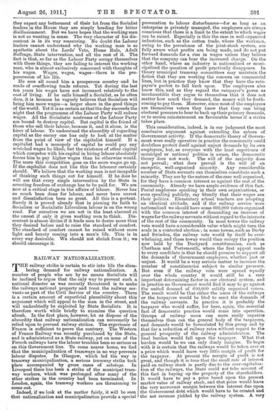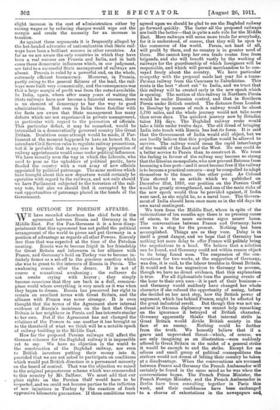RAILWAY NATIONALIZATION.
THE railway strike is certain to stir into life the slum- bering demand for railway nationalization. A number of people who are by no means Socialists will be inclined to argue that the only way to prevent such a national disaster as was recently threatened is to make the railways national property and treat the railway ser- vants as part of the Civil Service of the country. There is a certain amount of superficial plausibility about this argument which will appeal to the man in the street, and will undoubtedly be exploited by State Socialists. It is therefore worth while briefly to examine the question afresh. In the first place, however, let us dispose of the absurdity that railway nationalization can necessarily be relied upon to prevent railway strikes. The experience of France is sufficient to prove the contrary. The Western of France Railway was recently purchased by the State, and is administered as a State railway, yet on none of the French railways have the labour troubles been so serious as on this Government line. To come nearer home, we find that the municipalization of tramways in no way prevents labour disputes. In Glasgow, which led the way in tramway municipalization, a serious tramway strike took place accompanied by gross cases of sabotage. In Liverpool there has been a strike of the municipal tram- way workers, which was prolonged after many of the other strikes in the country had been terminated. In London, again, the tramway workers are threatening to come out.
Indeed, if we look at the matter fairly, it will be seen that nationalization and municipalization provide a special provocation to labour disturbances—for so long as an enterprise is privately managed, the employees are always conscious that them is a limit to the extent to which wages can be raised. Especially is this the case in well-organized industries, such as the cotton trade, where the workmen, owing to the prevalence of the joint-stock system, are fully aware what profits are being made, and do not put forward demands for a rise in wages unless they believe that the company can bear the increased charge. On the other hand, where an industry is nationalized or muni- cipalized the question of profit practically disappears. In theory municipal tramway committees may maintain the fiction that they are working the concern on commercial lines, but in practice they know that they have the rate- payer's pocket to fall back upon. The employees also know this, and as they regard the ratepayer's purse as inexhaustible they argue to themselves that it does not matter how much they demand, the money will be forth- coming to pay them. Moreover, since most of the employees are themselves voters they know that they can bring electoral pressure to bear to back up their primary demands, or to secure reinstatement on favourable terms if a strike takes place.
This consideration, indeed, is in our judgment the most conclusive argument against extending the sphere of Government activity. If the democratic theory of Govern- ment were really operative in practice the community could doubtless protect itself against unjust demands by its own employees, but, as everyone with the least experience of municipal or national politics is aware, the democratic theory does not work. The will of the majority does not prevail; what does prevail is the will of an energetic, well-organized minority. Any considerable number of State servants can themselves constitute such a minority. They are by the nature of the case well organized, for they have a common interest as against the rest of the community. Already we have ample evidence of this fact. Postal employees speaking in their own organizations, or even speaking publicly, say bluntly that their wages are their politics. Elementary school teachers are adopting an identical attitude, and if the railway service wore nationalized. we should have some 600,000 voters organized with the common interest of demanding an increase of wages for the railway servants without regard to the interests of the rest of the community. In most towns the railway vote would have a considerable value which might turn the scale in a contested election ; in some towns, such as Derby and Swindon, the railway vote would by itself be over- whelming, and these towns would then occupy the position now held by the Dockyard constituencies, such as Chatham and Portsmouth, where the first appeal made to every candidate is that he should promise to support all the demands of Government employees, whether just or unjust. It would be a very serious matter to increase the number of constituencies subject to similar pressure. But even if the railway vote were spread equally over the whole country it would still be a very important determining factor in our electoral system, and in practice no Government would find it easy to go against the united demand of 600,000 solidly organized voters. The result would be that either the users of the railways or the taxpayers would be bled to meet the demands of the railway servants. In practice it is probably the taxpayer who would suffer, for here, again, the essential fact of democratic practice would come into operation. Groups of railway users can more easily organize themselves than can the general body of the taxpayers, and demands would be formulated by this group and by that for a reduction of railway rates without regard to the general prosperity of the railway administration. The final burden would fall upon the taxpayer. What that burden would be we can only dimly imagine. To begin with it is certain that the railways would be taken over at a price which would leave very little margin of profit for the taxpayer. At present the margin of profit is not great, and though it is true that the small rate of interest paid on railway stock is partly due to the over-capitaliza- tion of the railways, the State could not take account of this fact in buying up the property of the shareholders. It would have to pay a price based upon the present market value of railway stock, and that price would leave the very narrowest margin between the interest due upon the Government debt which would have to be created and the net revenue yielded by the railway system. A. very slight increase in the cost of administration either by raising wages or by reducing charges would wipe out the margin and create the necessity for an increase in taxation.
As against these arguments it is frequently alleged by the hot-headed advocates of nationalization that State rail- ways have been a brilliant success in other countries. As far as we are aware the only countries in which they have been a real success are Prussia and India, and in both cases those democratic influences which, in our judgment, are fatal to a successful State management of railways are absent. Prussia is ruled by a powerful and, on the whole, extremely efficient bureaucracy. Moreover, in Prussia, partly owing to the general flatness of the land, the rail- ways were built very economically, and the consequence was that a large margin of profit was from the outset available. In India, again, where after many years of waiting the State railways have now become a financial success, there is no element of democracy to bar the way to good administration. But even in India those familiar with the facts are aware that State management has many defects which are not experienced in private management, in particular with regard to the promotion of officials. This particular defect, it may be remarked, would be intensified in a democratically governed country like Great Britain. Doubtless some attempt would be made, if Par- liament at the moment happened to have an honest fit, to introduce Civil Service rules to regulate railway promotions, but it is probable that in any case a large proportion of railway appointments would come under political influences. We have recently seen the way in which the Liberals, who used to pose as the upholders of political purity, have flooded the country with a vast army of new officials appointed by political patronage. The same motives which have brought about this new departure would certainly be operative with regard to the railways, and not only should we have Parliament subjected to the terrorism of the rail- way vote, but also we should find it corrupted by the vast opportunities of patronage placed in the hands of the Government.



































 Previous page
Previous page